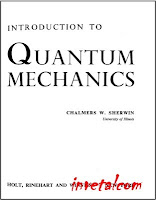Quantum Mechanics + Creation Movie Review + Drinking Myth
Part 1:
Quantum mechanics basically is talking about how things react on the molecular level, because it's completely different from our everyday life objects. It's a extremely complicated theory, but that's the basic definition of it. Richard Feyman once said that anyone who claims to understand quantum mechanics don't understand quantum mechanics.
Just before 1900, it became clear that classical physics was unable to explain certain phenomena. Coming to terms with these limitations of classical physics led to the development of quantum mechanics in the early decades of the 20th century, a major revolution in physical theory. Much of the universe on the largest scale does not neatly conform to classical physics, because of general relativity. Similarly, quantum mechanics means that the universe in the small also does not neatly conform to classical mechanics. The principles of quantum mechanics are difficult for the human mind to understand, because humans are accustomed to reasoning about the world on a scale where classical physics is an excellent approximation. Quantum mechanics is counterintuitive; in the words of Richard Feynman, it deals with "Nature as She is—absurd."
Many fundamental parts of the universe, such as photons, behave in some ways like particles and in other ways like waves. Radiators of photons, such as neon lights, have emission spectra, but these spectra are discontinuous in that only certain frequencies are present. The laws of quantum mechanics predict the energies, the colors, and the spectral intensities of electromagnetic radiation. But the same laws ordain that the more closely one pins down one measure (such as the position of a particle), the less predictable another measure pertaining to the same particle must become. Put another way, measuring position first and then measuring momentum does not have the same outcome as measuring momentum first and then measuring position. Even more disconcerting, pairs of particles can be created as entangled twins -- which means that an action that pins down one characteristic of one particle will instantaneously pin down the same or other characteristic of its entangled twin, regardless of the distance separating the entangled twins.
Part 2:
Creation is a 2009/2010 film. The film is a partly biographical, partly fictionalized account of Charles Darwin's relationship with his eldest daughter, Annie, as he struggles to write On the Origin of Species. British naturalist Charles Darwin is a young father who lives a quiet life in an idyllic village. He is a brilliant and deeply emotional man, devoted to his wife and children. Darwin is especially fond of his eldest daughter Annie, a precocious and inquisitive ten-year-old. He teaches her much about nature and science, including his theory of evolution, and tells her true stories of his travels. Her favorite story, despite the sad ending, is about the young orangutan Jenny, who is brought from Borneo to the London Zoo, where she finally died of pneumonia in the arms of her keeper. Darwin is furious when he learns that the family clergyman has made Annie kneel on rock salt as punishment for contradicting him about the existence of dinosaurs, as their existence and extinction contradicts the church's position that life is unchanging and perfect and that the Earth is very young.
Having returned from his expedition in the Galapagos Islands fifteen years earlier, Darwin is still working on finishing a manuscript about his findings, which substantiates his theory of evolution. The delay is caused by anxiety about his relationship with his religious wife, Emma, who fundamentally opposes his ideas. Emma worries that she may go to heaven and he may not, separating them for eternity.
After Annie becomes ill in 1851, Darwin takes her to the town of Malvern for James Manby Gully’s water cure therapy, against his wife Emma's will, but Annie becomes weaker and dies peacefully, after her father, at her request, tells her Jenny's story once more. Darwin is devastated. Annie's death sharpens Darwin’s conviction that natural laws have nothing to do with divine intervention. To his contemporaries, this is an idea so dangerous it seems to threaten the existence of God. In a box in Darwin’s study, we discover the notes and observations that will become On the Origin of Species.
The film shows Annie in flashbacks and hallucinations, a vibrant apparition who goads her father to address his fears and finish his masterwork. For a long time Annie's death is a taboo subject between Darwin and Emma, for Darwin fears that Emma blames him for their daughter's death. As a result of the strained relations between Charles and Emma, they stop making love entirely. Anguished, Darwin begins to suffer from a mysterious, fatiguing illness. - Wiki
Science Myth of the Week:
Does mixing drinks up really make you drunker?
No it doesn't, it all ends up in the same place, and no matter which way you ad the chemicals, the results are the same.


No comments:
Post a Comment